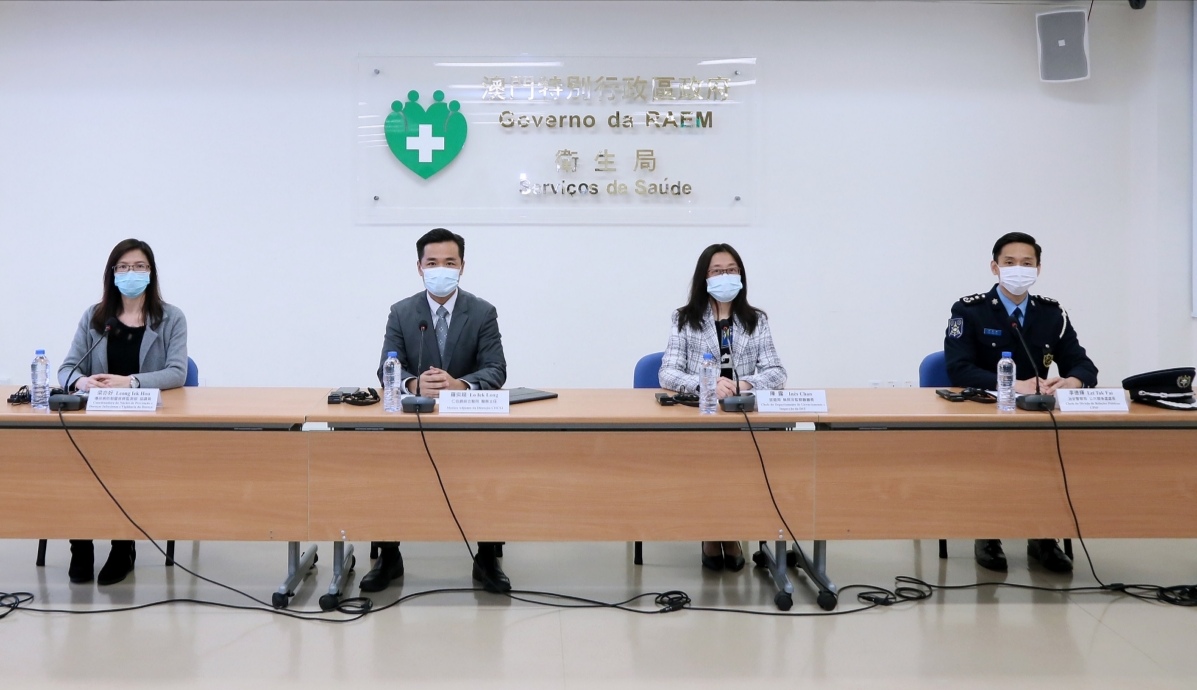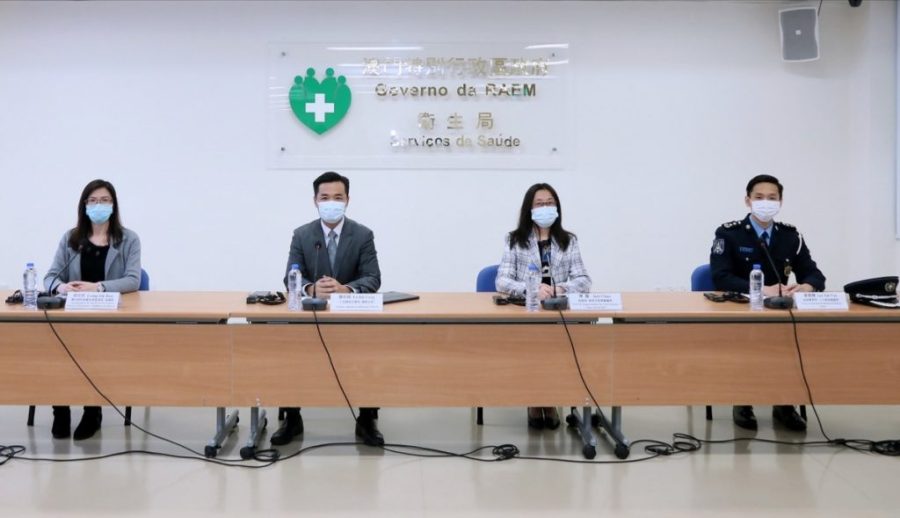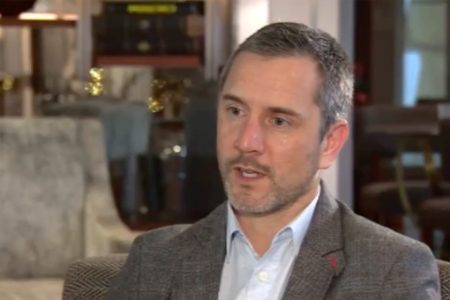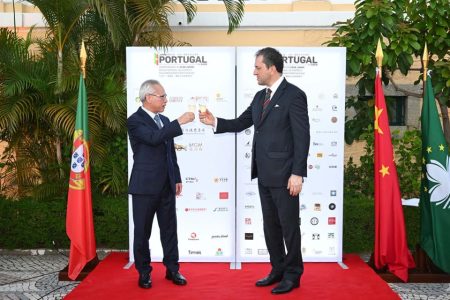Addressing Monday’s daily press conference about Macau’s novel coronavirus (COVID-19) situation, Alvis Lo Iek Long, a clinical director of the public Conde de S. Januário Hospital Centre, urged local residents who had regularly travelled to Hong Kong for medical treatment to consider receiving the corresponding treatment in Macau during the ongoing COVID-19 pandemic.
Lo made the remarks when replying to media questions about how the local government would help local residents who need to regularly travel to Hong Kong for medical treatment, in the wake of the suspension of the Hong Kong-Macau bus service on the Hong Kong-Zhuhai-Macau Bridge (HZMB). The suspension of the bus link sine die began yesterday.
The operating hours of the Hong Kong-Macau immigration counters at the delta bridge have been reduced from 24/7 to 10 a.m. to 8 p.m. since Sunday. The bus service between the Macau checkpoint and the Hong Kong checkpoint of the bridge (colloquially known as “Golden Bus” service) has been suspended since Monday.
The “Golden Buses” were the last public transport link between the two special administrative regions. Hong Kong unilaterally suspended its ferry link with Macau on February 4.
Inês Chan Lou, who heads the Licensing and Inspection Department of the Macau Government Tourism Office (MGTO), said during Sunday’s daily press conference that five or six local residents who need to regularly travel to Hong Kong for medical treatment had asked for help from the local government due to the “Golden Bus” service suspension, which was announced by the operator on Saturday.
During Monday’s press conference, Lo said that while the local government respects local residents’ rights to “choose the medical institutions that they think can help them [treat their disease]”, it also has to fully respect the anti-epidemic measures in different jurisdictions, including “Hong Kong’s measures to protect Hong Kong residents during the [COVID-19] epidemic”. “We cannot easily break other regions’ anti-epidemic measures,” Lo said.
Lo emphasised that the local government needs to strike the right balance between the society’s overall anti-epidemic measures and individuals’ need for medical services, urging local residents who have been receiving treatment in Hong Kong to consider receiving the corresponding services provided by Macau’s health system. Lo pledged that the local health authorities would definitely do their best to provide local residents with proper medical services.
Lo revealed that since the COVID-19 epidemic emerged in Macau and neighbouring regions, the public hospital started to “seriously” review its cases of local patients who have been referred to hospitals in Hong Kong for treatment, assessing whether these patients are in urgent need of travelling to Hong Kong to obtain treatment. “We need to see whether their regular trips to Hong Kong for medical treatment will jeopardise other local residents’ health,” Lo said.
Avoiding outbreak in hospital
Lo pointed out that during the COVID-19 epidemic, any cross-border flow of people, particularly when local residents visit hospitals elsewhere, entails a high risk for Macau, adding that consequently the public hospital has significantly reduced the number of cases of local patients receiving treatment in hospitals elsewhere, which he said aimed to protect local residents’ health. Lo said that the local government needed to “avoid a possible [COVID-19] outbreak in the [public] hospital after a [local] patient has returned to Macau following a visit to Hong Kong for medical treatment,” Lo said.
Lo underlined that in “very special” cases in which the life of a local patient receiving medical services in Hong Kong is being threatened and Macau’s health system is unable to tackle the case, the local government will definitely negotiate with its counterpart in Hong Kong to address the problem, based on a humanitarian approach. Lo was quick to add that these kinds of cases “are definitely not common”.
Meanwhile, Lo said that Macau’s 18th COVID-19 patient, the only case which has been classified as “serious”, still needed to use a ventilator. The local health authorities announced late last month that the condition of the patient, a 50-year-old local woman who had returned to Macau from New York with three children, had become “serious”. The Health Bureau (SSM) said last week that her condition was improving.
Lo said on Monday that the woman’s condition was stable.
Metropole & Regency Art no longer ‘quarantine hotels’
Meanwhile, Chan announced during yesterday’s press conference that the 326-room Regency Art Hotel in Taipa, one of the government’s “quarantine hotels”, will return to its normal hospitality role, following disinfection and cleaning.
Chan announced during Sunday’s daily press conference that after disinfection and cleaning, the 112-room Metropole Hotel in the city centre will resume its normal hotel service following its role as a designated hotel for quarantine and medical observation purposes. The Metropole became the first of the government’s “quarantine hotels” to return to its normal role. However, it still remained closed last night.
Regency Art Hotel became Macau’s third hotel for quarantine and medical purposes on March 19, while Metropole Hotel became the government’s fifth “quarantine hotel” on March 21.
Following the completion of the two hotels’ role as “quarantine hotels”, Macau still has 10 designated hotels for quarantine and medical observation purposes, with a total of about 2,600 rooms.
According to Chan, the two hotels will return to normal service after all those who completed their 14-day quarantine and medical observation there have checked out. According to Chan, the two hotels’ staff members have been carrying out disinfection and cleaning work under the guidance of the Health Bureau (SSM) since then.
Chan also said that as of yesterday afternoon 1,636 people were still undergoing their 14 days of quarantine and medical observation in the government’s now 10 “quarantine hotels” – comprising 1,378 Macau residents, 199 non-resident workers and 59 visitors.
Home quarantine is no longer practised in Macau.
(The Macau Post Daily/Macau News)
PHOTO ©






